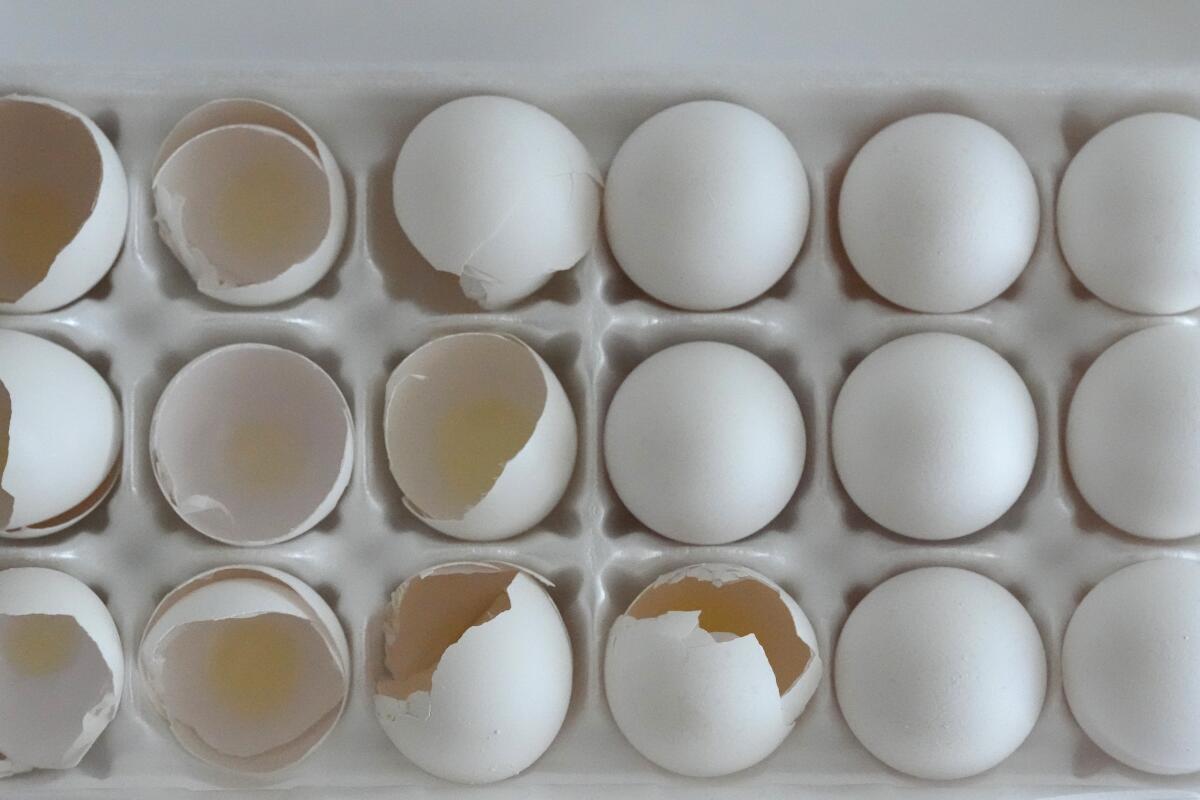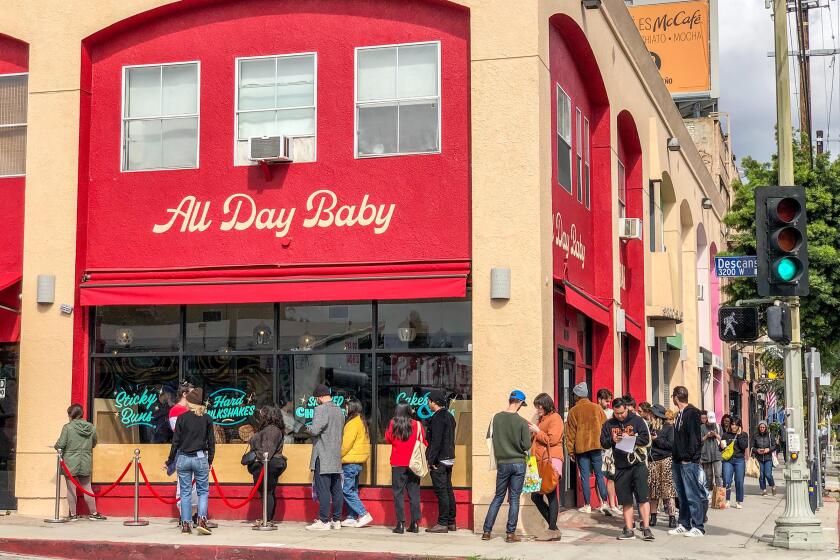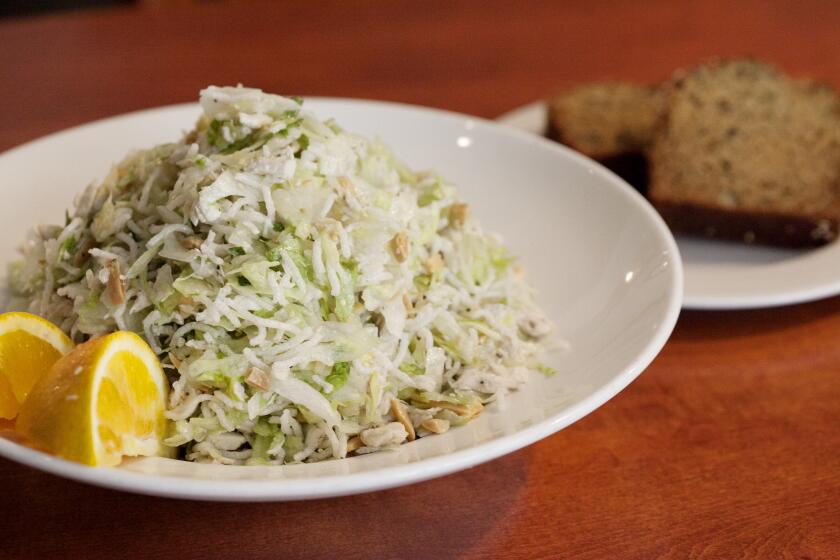With bird flu still affecting egg prices, brunch in L.A. may soon cost more

- Share via
- Restaurants are weighing whether to raise prices on egg dishes as the H5N1 strain of the bird flu virus continues to spread, affecting the egg supply.
- In California, prices have soared to $8.97 a dozen, a 70% increase in the last month, according to the U.S. Department of Agriculture.
- “I don’t want people paying $16 or $17 for breakfast burritos,” one restaurant owner says. “I don’t like the way that feels.”
Ongoing egg shortages in California due to the spread of bird flu among livestock are bringing another early 2025 challenge to local restaurants, especially brunch spots that rely heavily on eggs for menu items.
It’s also unclear how January’s ongoing fire disasters could affect eggs and other staple ingredients. But, in light of difficult times overall for the industry and a traditionally slow January, some restaurateurs earlier this week said they have already been forced to raise prices for diners, or are weighing whether to do so, according to multiple interviews.
In San Luis Obispo, Philip Lang, who has operated Bon Temps Creole Café for nearly 30 years, said he increased the price on egg items on his menu right before Christmas. For instance, a $15 menu item with two eggs now costs $17.
Before the bird flu outbreak, he paid $20 for a case of 15 dozen conventional eggs. Since bird flu, the price has kept doubling, starting from about $50 to now about $110 a case.
“Eggs go into all of our dishes,” he said of his restaurant that opens only for breakfast and lunch. “We make our hollandaise with eggs and dressings with eggs.”
He said most diners are understanding but some still express disappointment.
In Irvine, eggs go in just about every dish at Burnt Crumbs, from bestselling Japanese-style soufflé pancakes to the breakfast fried rice, said chef-owner Paul Cao. On an average week, Cao said his kitchen goes through 180 to 225 dozen eggs. Cao now is having to pay more than double compared to three months ago — up to $130 for a case of 15 dozen eggs.
The H5N1 strain of the bird flu virus continues to spread across the globe, curtailing egg supply and making them more expensive and difficult to find. There’s no sign of relief, with scientists and health officials fearing we’re on the verge of another global pandemic. In California, egg prices have soared to $8.97 a dozen, a 70% increase in the last month, according to the U.S. Department of Agriculture.
Cao said he doesn’t plan to raise prices for now. “I’ll give it until March — first quarter 2025, if this doesn’t trend in the right direction, we will have to raise prices. We can’t keep eating costs,” he said.
He’s afraid of losing customers but said he can’t sustain the cost increase for long. “When egg prices go up $2 per dozen, that costs us a couple thousand a month,” he said.
Labor costs, delivery app fees, tipping and service charges are among the existential challenges facing restaurants in 2025

Walter Manzke, who co-owns République with wife and partner Margarita Manzke, said he feels lucky that he can still procure good eggs from his distributor despite the shortage.
He doesn’t expect to raise prices on his menu but is definitely feeling the squeeze because so many of his well-known dishes use eggs — including his popular French toast.
“We’re just doing the best we can,” he said of the Hancock Park restaurant that ranked No. 4 last year on The Times’ 101 Best Restaurants in Los Angeles guide. “Compromising on quality is not an option.”
On Friday, Delilah Snell, who operates Alta Baja Market, temporarily raised prices to her egg dishes by $1 at her restaurant and market in Santa Ana.
Snell now is paying $131 for a case of 15 dozen free-range organic brown eggs. In October, she paid around $70. She said she could pay less for lower-quality eggs but doesn’t “want to compromise the quality” her customers have come to expect.
On the front counter menu of her store, she posted a sign that reads: “Over the past few weeks, our prices have gone up 40% (and are continuing to rise) because of the bird flu. As a result we need to add a $1 surcharge to all dishes with eggs to cover this expense to still provide you with a high-quality product.”
Once prices drop, she said, she’ll remove the surcharge.
The spike in egg prices comes on the heels of a slow COVID-19 pandemic recovery, as many restaurants in Southern California continue to struggle.
Lang of Bon Temps said there is now a notice on top of the menu that alerts customers to the $1 temporary increase per egg.
The notice reads: “Due to the bird flu that has caused the price of eggs to quadruple in recent months, we find it necessary to add a surcharge of a dollar per egg for all dishes containing eggs until the price of eggs comes down. We regret each time we are forced to raise any of our prices. Please know that we are not doing this for profit, only to maintain our business during these difficult times. Thank you for your understanding.”
Lang said he plans to do away with the surcharge once prices go down to about $50 for a case of 15 dozen eggs.
In a year markedly difficult for the city’s restaurant industry, here are more than 100 notable restaurant and bar closures that occurred in 2024.

As egg prices tick up, shoppers also are reporting shortages.
On Tuesday afternoon, Cao said the egg shelves at Song Hy market in Little Saigon in Garden Grove were more than half empty. The store, known for its inexpensive groceries, was selling cage-free medium eggs for $8.99 a dozen, according to a video he provided.
Around the same time, an egg cooler at a Trader Joe’s in Irvine was already nearly half empty after having just received a fresh shipment late that morning, one shopper said. A day earlier, at a nearby Costco, Cao said there was a line of at least 12 people waiting to grab a case of a dozen eggs from shelves that were half-empty.
Some restaurant owners, such as Jasmin Gonzalez, who runs Breezy in San Juan Capistrano, have opted to raise prices on other menu items and avoid a price hike on the restaurant’s popular egg dishes.
Her restaurant — which serves a Filipino-inspired brunch — will be closed for a couple of weeks for a remodel, she said, and she’ll likely raise prices on some items once it opens, mostly on higher-margin items, such as coffee. That would help the restaurant offset the price of eggs and other increased costs, including the statewide minimum-wage increase, she said.
Gonzalez said she doesn’t feel comfortable changing the price of her $14.99 breakfast burrito, a bestseller.
“I don’t want people paying $16 or $17 for breakfast burritos,” she said. “I don’t like the way that feels.”
More to Read
Eat your way across L.A.
Get our weekly Tasting Notes newsletter for reviews, news and more.
You may occasionally receive promotional content from the Los Angeles Times.













